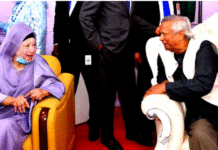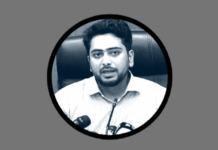Human rights funds dwindle, work shrinks

When his brother Ishtiaque Hossain was killed while in custody at the Pallabi police station in the capital city, Mohammed Rocky filed a case. The organisation which had come forward to support him with legal aid, seemed to have lost interest towards the middle of last year. Rocky is at a loss.
Speaking to Prothom Alo, Rocky said that his brother Ishtiaque was killed on 8 February 2014. The police refused to register any case in this regard and so, with the help of Bangladesh National Women Lawyers Association (BNWLA), he directly filed a case with the Dhaka judge court.
The trial began the following year at the lower court.
Last year the defendants filed a writ with the High Court asking for the case to be dropped. The High Court issued a stay order on the trial at the lower court. When Rocky, a garage mechanic, approached BNWLA, he found out that his lawyer was no longer there. In fact, the organisation was running without any executive director.
Rocky then turned to Bangladesh legal Aid and Services Trust (BLAST). The stay order on the case has been lifted, but Rocky does not know who will help him with the case. The accused police members continue to threaten him and also offer to bribe him, but Rocky is determined to get justice.
A number of former and present staff members of BNWLA have said that the organisation has no funds. There has been a downsizing of both staff and services. Those seeking support are suffering.
This organisation of women lawyers, established in 1979, has conducted innumerable cases related to under-age sex workers, trafficking of women and children, torture and more.
BNWLA director Towhida Khandakar told Prothom Alo, donor agencies are no longer providing assistance for long-term projects. There was a time when the organisation ran around 20 to 22 five-year projects all around the country. They had offices in around 35 districts, along with lawyers. Now they only have nine projects, that too short-term.
Prothom Alo’s investigations regarding the state of the country’s human rights organisations reveal that at least three other such organisations are strapped for cash. With their projects dependent of foreign funding, these have slowed down considerably. And the leading human rights bodies are also facing organisational problems.
Funds dwindle, projects close
Human rights activists say that donors are reluctant to provide funds other than to a few selected projects of their choice.
Deputy secretary of the NGO Affairs Bureau Hoore Jannat told Prothom Alo that the funds were mostly coming for campaigns and training purposes.
The legal aid organisation Ain O Salish Kendra would mainly receive funds from the embassies of Norway, Denmark and Switzerland, from Swedish and German donor agencies and from the international aid agency Oxfam. According to its 2017 annual report, Ain O Salish Kendra’s budget till 2012-16 was around Tk 800 million.
In 2015, the Norway embassy stopped its funds due to changes in foreign policy. Ain O Salish Kendra had to make adjustments in 60 per cent of its plans. In its report, the organisation stated that the poor, endangered and powerless people received less assistance than before. And it also had to lay off many of its skilled and committed staff members.
An official of Ain O Salish Kendra’s investigation team, on condition of anonymity, said Norway would provide almost half of their funds. After their funds were withdrawn, the organisation’s staff was downsized from 160 to 56. The nine-member investigation team now had five members. Most of the public litigation lawyers were also rendered redundant. Previously over a hundred investigation reports were drawn up annually. This had now been reduced to half.
Hoore Jannat of the NGO Bureau told Prothom Alo over the past five years since 2014, Ain O Salish Kendra has been running eight projects. Five deal with child rights and the other three deal with human trafficking, Sustainable Development Goals (SDG) and democracy respectively.
Founded in 1986, Ain O Salish Kendra used to deal with a wide gamut of issues including problems of prisoners, slum eviction, extrajudicial killings, forced disappearances, militant activities and more.
It had a lot of focus on repression, including torture by law enforcement agencies, torture of women and child domestic workers, of migrant workers, journalists, minorities and ethnic minorities. Officials of the organisations say they still try to keep watch on all aspects of human rights violations.
In 2015 the Norway embassy also closed its funding to Bangladesh Mahila Parishad. This women’s rights organisation now only has one human rights project, funded by the Swedish embassy.
The registration of Odhikar, established in 1994, is yet to be renewed. Its work has dwindled to almost nothing.
Organisational crisis
A number of employees of BRAC, Madaripur Aid Association, Ain O Salish Kendra, BLAST and BNWLA have said that there is a crisis of activism within the organisations.
A former BNWLA employee told Prothom Alo, on condition of anonymity, that when Sohagi Jahan Tonu was killed in the Cumilla cantonment, the executive director of the association at the time, Salma Ali, went herself all the way to Cumilla to dig out the facts, despite all obstacles. No one has that spirit anymore.
Bangladesh Mahila Parishad was founded in 1970 and is the largest women’s organisation in the country. It has around 175,000 members at present. It became dependent on foreign funding from the mid-nineties. Previously it had run on funds provided by its members and well-wishers. It had built up a movement for political, social and women’s rights. Progressive left-leaning persons had been associated with the organisation.
Mahila Parishad had always taken a strong stand against women’s oppression, dowry and such issues. In 1993 it played a significant role against fatwa when Nur Jahan had been stoned to death in Kamalganj of Maulvibazar.
Yet this organisation did not come forward to stand beside the woman who was gang raped in Subarnachar on the night of the election. In fact, most of the leading human rights organisations remain aloof. The woman had said that she was gang raped simply because she did not vote for the boat symbol of the ruling party.
In 2016, Sultana Kamal resigned as executive director of Ain O Salish Kendra and head of the investigation unit, Nur Khan, became acting director. He too resigned soon after and the organisation underwent a leadership crisis.
However, the present executive director, Shipa Hafiza, does not see it that way. She said that they are looking into most incidents of human rights violations and are also received fresh foreign funding. However, she did not provide any evidence of this.
BNWLA has other problems too. The post of executive director has been lying vacant since Salma Ali resigned in 2017. Allegations of financial irregularities within the organisation had arisen over the Rana Plaza project. Salma Ali left the organisation when differences emerged over the issue.
The present 17 members of the executive committee are all practicing lawyers and are volunteers of BNWLA. They cannot work full time with the organisation.
Human rights activist and former advisor to the caretaker government Sultana Kamal, speaking to Prothom Alo, said one has to face all sorts of resistance, including from the state, when working for human rights. It is imperative to have bold and strong leadership. That is a problem at present.
Honorary executive director of BLAST Sara Hossain and BNWLA president Fawzia Karim Firoz place importance both on leadership and fund generation.
Sara Hossain told Prothom Alo, in developed countries like the UK, both government and non-government organisations work for human rights.
Fawzia Karim also said, in western countries, the government or foundations run by wealthy people, provide funds to human rights organisations. This should happen in Bangladesh too.
* This piece appeared in the print edition of Prothom Alo and has been rewritten in English by Ayesha Kabir









